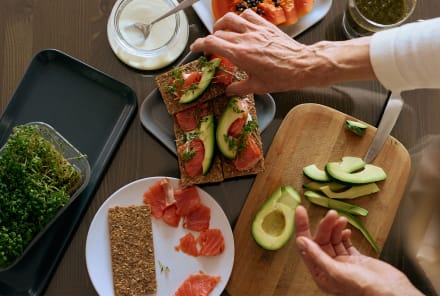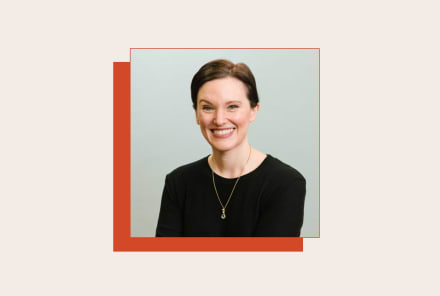Advertisement
What Is Orthorexia? Symptoms & Treatment Options, From Experts


Trigger warning: This article discusses obsessive dieting and disordered eating. Those who struggle with an eating disorder can visit the National Eating Disorders Association for support.
In a world filled with "What I eat in a day" videos, it's difficult to distinguish between a passion for healthy eating and an obsession with it.
To come, experts share their perspective on orthorexia, an eating disorder defined by extreme food rigidity that's difficult to diagnose—but increasingly common.
What is orthorexia?
"Orthorexia nervosa is an eating disorder that involves a fixation on healthy eating and ritualistic behavior," explains Rafaat W. Girgis, M.D., a board-certified psychiatrist at Moment of Clarity, a mental health treatment center.
The term "orthorexia nervosa" was coined by physician Steven Bratman in 19971, and it translates to "right" or "correct" (ortho) and "appetite" (orexis) in Greek. In essence, orthorexia is a severe obsession with eating healthy.
Orthorexia is more common among younger people, affecting between 6.9% and 45.5% of adolescents and young adults2. The wide range is due to discrepancies in different studies, suggesting that this eating disorder calls for more organized research to assess prevalence accurately. However, the presence of orthorexia does seem to be steadily increasing in recent years, likely for reasons we'll touch on in a bit.
The thing is, "healthy" eating looks different for everybody. One person could see a very restrictive vegan diet as healthy; others a raw meat diet, some a low-carb diet, and so on—which makes this eating disorder difficult to identify.
"[Orthorexia] often just looks like healthy eating. The signs of rigidity, obsessiveness about disease, and health are often unrecognized," adds registered dietitian and founder of Real Nutrition Amy Shapiro, R.D.
Say two people were on a road trip and had to stop for a meal at a diner. Both people may be healthy eaters in their day-to-day and prefer minimally processed natural foods. However, the person struggling with orthorexia will likely feel much more guilt and anxiety surrounding the diner food—even if it's the only option.
That person with orthorexic tendencies may feel the urge to skip the meal altogether for the sake of preserving their clean eating patterns, while the other person may be able to consume the healthiest option they find on the menu without lasting shame or anxiety about how it will impact them. In essence, people who struggle with orthorexia never allow for imperfection when it comes to their diet, and if they have to for any reason, intense emotional discomfort follows.
This same situation can be applied to events like birthdays, holidays, and other celebrations where available food items may not be as healthy as one is used to.
This also makes the disease more difficult to treat, says Girgis, since many with orthorexia "believe they are right and refuse to see the negative in what they are doing to themselves," he says.
Warning signs of orthorexia
While orthorexia can be hard to identify, these are signs that healthy eating is veering into potentially dangerous territory:
- Mental preoccupation with food: Unlike anorexia nervosa, someone with orthorexia may not seek to lose weight. Rather, they obsess over the cleanliness of their food or how it fits into their category of healthy food—whatever that means to them. These thoughts will take up much of their mental space throughout the day.
- Shame around diet choices: People with orthorexia tend to feel extreme fear and a sense of personal impurity or shame when their self-imposed food restrictions are broken, Girgis says. This can happen even if the food is not stereotypically "unhealthy."
- Intense cleansing: Those with orthorexia may also do partial or full "cleanses" in an effort to purify their body as a result of shame, Girgis explains.
How it compares to other eating disorders
Many people assume orthorexia is similar to anorexia, but it's actually quite different. "Orthorexia revolves around quality, not quantity," Girgis says.
He adds, "Unlike those with anorexia nervosa or bulimia nervosa who seek to be thinner, patients with orthorexia focus on ritualistic beliefs that healthfulness of food is the primary goal rather than losing weight."
That being said, multiple eating disorders can exist at once, and they can overlap with other mental health conditions. "Orthorexia can overlap with other conditions like anorexia and bulimia, obsessive/compulsive disorder, anxiety, and depressive disorders as well," Girgis says.
However, it's unconfirmed whether healing the symptoms of one disorder can help people recover from another, given the lack of research surrounding orthorexia.
How social media normalizes orthorexia
If reading about extremely rigid food choices has you thinking, "That sounds familiar," it could be due to the fact that social media outlets like TikTok and Instagram are filled with health advice from people struggling with orthorexia.
It's important to remember that "What I eat in a day" videos are almost never realistic, and even if they are, that doesn't mean they are automatically going to be the best option for everyone (especially if the tips or recipes aren't from nutrition experts).
It’s important to remember that 'What I eat in a day' videos are almost never realistic
The hard part: "Oftentimes you will not see credentialed individuals showing their entire day, maybe a meal or their supplements or their exercise routine that day," Shapiro says. This can perpetuate unrealistic standards and leave the viewer to assume their entire day should look like what they see on the screen.
These types of videos have created a heightened obsession with what other people eat, which is especially triggering for those who have struggled with eating disorders in the past or are currently struggling.
How to cope
Orthorexia is a serious health concern and should be treated like one. Below, some ways to get to the root of orthorexia and encourage a balanced mindset surrounding your diet:
Get professional mental health support
"My go-to treatment for eating disorders or obsessive-compulsive disorders is always going to be cognitive behavioral therapy (CBT)," Girgis says.
This method helps the patient to identify the thoughts and feelings that directly affect their behaviors. Once you teach someone how to challenge and change negative thinking about food, their self-image and food behavior can then improve as well.
Girgis also suggests dialectical behavioral therapy (DBT), which combines cognitive and behavioral therapy with meditation. He says this can help people practice coming to terms with their thoughts and feelings instead of avoiding them.
Consider nutrition counseling
Learning about the different nutrients that one needs in their diet can also help those with orthorexia. This is where consulting with a registered dietitian can be extremely helpful, as they help you learn how to build a physically and mentally healthy eating pattern.
Curate your social media
If you are on social media of any kind, it's a good idea to curate your feed to only include positive, helpful information.
This could mean unfollowing someone who preaches disordered eating, skipping videos that promote strict diets, or taking a break from social media altogether.
"I think it is impossible to discuss nutrition, health, good ingredients without making it worse for those who are susceptible to this eating disorder," Shapiro says. "Any content discussing a fruit, vegetable, grain, or recipe can be used to promote further obsession," she notes.
Build a supportive network
As many therapists will tell you, the power of a support system is truly unmatched. Surround yourself with trusted friends and family who support you on the journey to healing your relationship with food.
If there are people in your life who negatively contribute to the obsession with healthy eating, voice your concerns about your own mental health and create boundaries that will contribute to a beneficial, not triggering, relationship. A therapist can help you do this as well.
Accept that healing takes time
Finally, accept that healing from an eating disorder takes a great amount of time and effort—in other words, it won't happen overnight.
Give yourself some grace during the journey and know that recovery is a marathon, not a sprint, and just taking the first step is enough.
For those not struggling with orthorexia
As for anyone not personally struggling with disordered eating, it's equally important to monitor your own comments, social media posts, etc., and make sure you're not contributing to a negative diet culture when possible or propping up those who do—knowingly or unknowingly.
As Shapiro says, "We need to educate people on the seriousness of this as many people just confuse this type of behavior as 'gold standard nutrition' or 'great willpower.'"
Have open conversations with your loved ones, and always reach out when you think someone may be struggling.
The takeaway
Orthorexia is an eating disorder that involves obsessively fixating on healthy eating to the point that it interrupts your life and negatively impacts your mental health. Treatment options include therapy and nutrition counseling. If you or someone you know is struggling with an eating disorder, visit the National Eating Disorders Association for support.
Watch Next
Enjoy some of our favorite clips from classes
Enjoy some of our favorite clips from classes
What Is Meditation?
Mindfulness/Spirituality | Light Watkins
Box Breathing
Mindfulness/Spirituality | Gwen Dittmar
What Breathwork Can Address
Mindfulness/Spirituality | Gwen Dittmar
The 8 Limbs of Yoga - What is Asana?
Yoga | Caley Alyssa
Two Standing Postures to Open Up Tight Hips
Yoga | Caley Alyssa
How Plants Can Optimize Athletic Performance
Nutrition | Rich Roll
What to Eat Before a Workout
Nutrition | Rich Roll
How Ayurveda Helps Us Navigate Modern Life
Nutrition | Sahara Rose
Messages About Love & Relationships
Love & Relationships | Esther Perel
Love Languages
Love & Relationships | Esther Perel

















